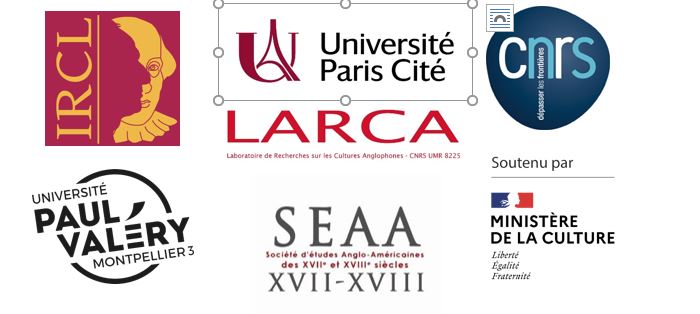Consent, Refuse, Surrender
Shadows of Conquest during the English Restoration
1660-1714
- Joint conference IRCL (Université Paul-Valéry Montpellier 3) – LARCA (Université Paris Cité)
- With the support of the Société d’Études Anglo-Américaines des XVIIe et XVIIIe siècles (SEAA 17-18)
- Keynote lecture : Geneviève Fraisse, philosopher in feminist thought, director of research emerita, CNRS/CRAL-EHESS
Conference date: 14th June 2024 - Location: Université Paul-Valéry Montpellier 3, salle des colloques 2, Site Saint Charles 1, Montpellier, France
“Because a blessing waits upon Obedience: / You might command me ‘gainst my Inclination, / But I am bless’d with such indifference, / That ‘tis no trial of my Duty, Sir, / To give my free consent” declares Emilia in Sir Robert Howard’s 1662 The Surprisal. By claiming that she consents both “free[ly]” and [out of] duty” to submit herself to her father’s will, Emilia sheds light on some of the tensions inherent in the act of consenting. Can consent be given freely if it is insisted upon? Does Emilia consent to her father’s will or to the obligations of filial obedience? Moreover, in the context of the English Restoration, what might be the significance of representing resistance or refusal on the public stage?
Consent and refusal both suggest the agency, autonomy, even freedom of the individual, while being by definition responses, therefore secondary actions. Consent is an ambivalent notion that can legitimise an act or – through its absence – potentially render it criminal. Consent, refusal, and surrender all have distinct definitions, nevertheless their expressions are always in danger of being mistaken for each other. Consent can range from a freely given act to one that is purely perfunctory, or even forced by circumstances. It can evolve, from acceptance to refusal, perhaps even to rebellion, or any combination of these meanings. Consent can be granted at a given moment, through a performative gesture such as the ratifying of a contract or verbal agreement, but it can also be tacitly granted, or considered as such as long as it is not explicitly denied. Such are the paradoxes that structure the concepts of consenting and refusing: both personal and relational actions, intimate affirmations of individual will, yet never separated from the power dynamics that frame them.
The focus of this conference is on the British Isles and their colonies during the second half of the seventeenth century. Nonetheless, broader, European perspectives are equally welcome, ranging from perceptions of the British Isles from abroad to comparative studies involving Restoration culture.
Building on two decades of debates and controversies around the notions of legitimate and illegitimate authority, of de jure versus de facto power, the period known as the English Restoration, from 1660 to the end of Anne’s reign in 1714, is permeated with social, religious, and political upheavals. Amongst those are the restoration of the monarchy and of the Anglican Church, the Exclusion Crisis and the Glorious Revolution, which can all be interpreted as ’crises of consent’. They encompass political and philosophical debates regarding the legitimacy of the restored monarchy, a model questioned throughout the reigns of Charles II and James II, then rejected through what can be read as assent (paradoxically) to a foreign invasion from the Low Countries.
The political sphere is far from being the only one to crystallise the tensions surrounding consent during the Restoration. The condition of Nonconformists and Dissidents -caught between a conformity imposed from above and the commitment of their own private beliefs -raises the issue of the various strategies adopted to practise a religion other than that supported by the Anglican Church. Between point blank refusal to conform, affected conversion and conformity, the religious issue articulates different modes and expressions of consent and refusal that question the notions of tolerance and freedom of conscience.
Gender relations also remain a heated source of debate in this period, the issues of marriage and sexuality being intensely discussed, notably through the arts. Theatre in particular sees both the introduction of the first actresses and professional female playwrights, and the development of the rake on the Restoration stage, figure of predatory seduction that later becomes a contested cultural archetype, testament to its relevance in seventeenth century society.
This conference opens a conversation between literary, cultural, historical, philosophical, legal, medical, and artistic perspectives to analyse and historicise the mechanisms that structure the notions of consent, refusal and surrender, and to study their evolutions across the breadth of the period. The goal of this conference is both to analyse the specific expression of these notions during the Restoration period, and to see how they enable us to rethink it. Finally, this project is launched with the aim of establishing an interdisciplinary research group on the Restoration.
In addition to the emphases already mentioned, proposals can address but are not limited to the following issues:
- Metaphors for consent and metaphoric shifts in meaning enabling the intersection of different types of consent (political and sexual in particular)
- Social contract theories and their uses during the Restoration to (de)legitimise a system/political order
- Consequences of consenting, refusing and surrendering, or of seeing one’s consent violated: notions of memory, denial and trauma
- Signs of consent and refusal, and their interpretation in the arts and medical or legal texts
- Generic tensions around the notions of consent, refusal and surrender in the arts (comedy/tragedy/tragicomedy ect.)
Please send abstracts (300-500 words) along with biographies and bibliographies to the following before 15th November 2023:
Scientific committee:
- Prof. Florence MARCH, IRCL, Université Paul-Valéry Montpellier 3
- Prof. Frédéric OGÉE, LARCA, Université Paris Cité
- Prof. Andrew HISCOCK, Bangor University-CNRS
- Prof. Luc BOROT, IRCL, Université Paul-Valéry Montpellier 3
- Dr Clara MANCO, LARCA, Université Paris Cité
- Alice MARION-FERRAND, IRCL, Université Paul-Valéry Montpellier 3
- Sara LEUNER, LARCA, Université Paris Cité
Indicative bibliography:
BOWERS Toni, Force or Fraud; British seduction stories and the Problem of Resistance 1660-1760, Oxford, Oxford University Press, 2011.
CHAKRAVARTHY Urvashi, Fictions of Consent: Slavery, Servitude, and Free Service in Early Modern England, Philadelphia, University of Pennsylvania Press, 2022.
CHUA Brandon, Ravishment of Reason: Governance and the Heroic Idioms of the Late Stuart Stage, 1660-1690, Cranbury, Rowman & Littlefield, 2014.
FRAISSE Geneviève, Du Consentement (2017), Paris, Points Seuil, 2022.
GARCIA Manon, MAZALEIGUE-LABASTE Julie and MORNINGTON Alicia-Dorothy eds., Envers et revers du consentement, Paris, Mare & Martin, 2023.
HOLMES WILLIAMSON Margaret, Powhatan Lords of Life and Death: Command and Consent in Seventeenth-Century Virginia, Lincoln, University of Nebraska Press, 2003.
KAHN Victoria, Wayward Contracts: the Crisis of Political Obligation in England 1640-1674, Princeton, Princeton University Press, 2004.
LEMMINGS David, Law and Government in England during the Long Eighteenth Century: from Consent to Command, Basingstoke, Palgrave Macmillan, 2015.
MARSDEN Jean I., “Rape, Voyeurism, and the Restoration Stage”, in Katherine M. QUINSEY ed., Broken Boundaries: Women and Feminism in Restoration Drama, Lexington, University Press of Kentucky, 1996.
REID Jasper William, ‘The Common Consent Argument from Herbert to Hume’, Journal of the History of Philosophy, 53.3, 2015, pp. 401–33.
RUDOLPH Julia, “Rape and Resistance: Women and Consent in Seventeenth-Century English Legal and Political Thought,” Journal of British Studies, 39.2, 2000, pp.157–84.
TAMAS Jennifer, Au Non des femmes, Paris, Seuil, 2023.
VIALA Alain, La France galante : Essai historique sur une catégorie culturelle, de ses origines jusqu’à la Révolution, Paris, Presses Universitaires de France, 2008.
WALKER Garthine, “Rape, Acquittal and Culpability in Popular Crime Reports in England, c.1670–c.1750”, Past & Present, 220.1, 2013, pp. 115–142.


